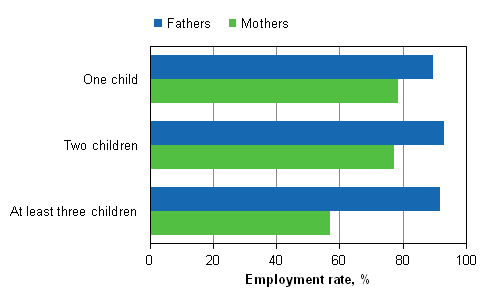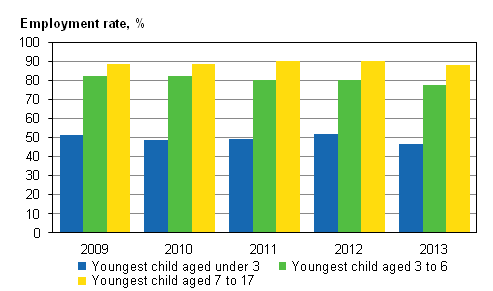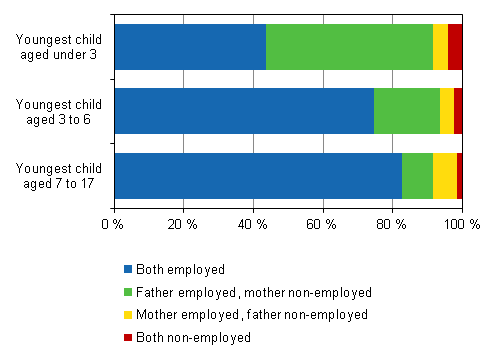3. Labour market position of parents in families with children
The number of children in the family affects the employment of mothers more clearly than that of fathers. The employment rate of fathers has for several consecutive years been around 90 per cent regardless of the number of children. In 2013, altogether about 78 per cent of mothers with one or two children were employed, while of mothers with at least three children 57 per cent were employed. (Figure 1.) The reduction in the employment of mothers from 2012 to 2013 is clearly visible in families with several children. In 2012, as many as 65 per cent of mothers with three or more children were employed.
Figure 1. Employment rates of fathers and mothers aged 20 to 59 by number of children in 2013

The age of the youngest child in a family affects mothers' employment. The employment rate of mothers with children aged under three was 46 per cent in 2013. Once the youngest child goes to school the employment rate of mothers has risen almost to the same level as that of fathers. The decline in the employment rate of mothers from 2012 to 2013 was highest among mothers with children aged under three. (Figure 2.)
Figure 2. Employment rates for 20 to 59-year-old mothers by age of their youngest child in 2009–2013

Fathers usually take shorter family leaves than mothers. During the paternity leave or the other family leaves under three months, fathers are classified as employed, so family leaves have little impact on the employment rate of fathers.
Both the father and the mother were employed in 68 per cent of the two-carer families with children in 2013. When the youngest child is between three and six years old, in 74 per cent of the two-parent families both parents are employed and this is so for as many as 82 per cent of the parents of school-age children. When the youngest child grows, the number of families with children where both parents are non-employed decreases. When the youngest child is under three years old, both parents are non-employed in seven per cent of two-parent families, while among parents of school-age children this is so for only two per cent of families. (Figure 3.)
Figure 3. Labour market position of parents in families with children with two carers aged 20 to 59 by age of youngest child in 2013

Source: Labour Force Survey 2013. Statistics Finland
Inquiries: Tarja Nieminen 029 551 3561, Anna P�rn�nen 029 551 3795, tyovoimatutkimus@stat.fi
Director in charge: Riitta Harala
Updated 7.10.2014
Official Statistics of Finland (OSF):
Labour force survey [e-publication].
ISSN=1798-7857. Families and work 2013,
3. Labour market position of parents in families with children
. Helsinki: Statistics Finland [referred: 19.4.2025].
Access method: http://stat.fi/til/tyti/2013/14/tyti_2013_14_2014-10-07_kat_003_en.html

